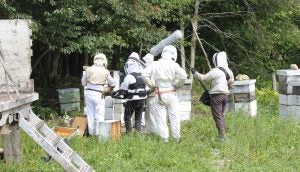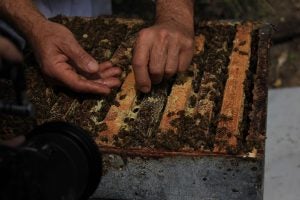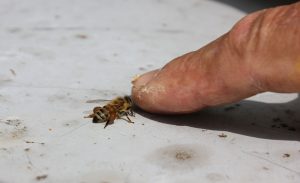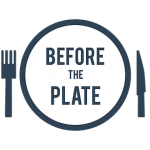Earlier this week, “Before The Plate” visited a commercial beekeeping operations for a segment on our pollinating friends that will be part of the finished documentary (2018). The day was action-packed and one of the most interesting and information-intensive days this project has seen thus far. The crew had been anticipating this day from the project’s beginning, for many reasons, but mainly so as to get a first-hand glimpse at something that has had its fair share of attention in the media over the last few years. We knew this would be a rare opportunity to speak to a real beekeeper about the bee population issues and how that relates to agriculture.

As with most things I am learning in agriculture, there is a lot more to the story than what meets the eye, and as a city-dweller I am usually only getting the very first layer of information on the subject. I found this to be especially true when it comes to bees and their wellbeing. Throughout the day I was challenged with the complex habits of these little creatures — so much so that it truly felt like it was almost too much for me to comprehend. After seeing so much, I was more eager than usual to sit down with the beekeeper and pick his brain on the issues at hand and how we should deal with them as responsible members of the agricultural community.
We dove into many issues relating to bee health, from weather and habitat right down to the more political issues of crop protection products. Our beekeeper pointed out that the media only seems to be cherry picking what issues they want to talk about and that pesticides seems to be their favorite. We asked him if having conversations like this was helpful for progression in the ag industry and what his thoughts were about most of the “save the bees” campaigns? He said, “As a commercial beekeeper I am more supportive of keeping the bees healthy than most, but that train stops when saving the bees becomes a method to attack modern agriculture. I don’t think going back to 19th century farming is a good idea for anyone, especially for the health of the planet and the environment. Many groups have gotten behind the honeybee to push their agenda and their message of anti-modern farming.”

He also mentioned that “if the question boils down to: ‘Will stopping the use of all pesticides make it easier to keep my bees?’ The answer is yes, but that is not a sustainable option to feed 9 billion people by the year 2050. New technology in how pesticides are applied limits bee exposure and allows for less complications when it comes to bee health. I am looking forward to seeing more new technology that will help us reduce the use of pesticides, from genetic modification to other new innovative ideas to help feed a growing population. I am part of the agricultural community, and farmers play a key role in the success of my bee operation and health of my bees. A rising tide lifts all boats, and responsible use of related agricultural technologies is key to the success of my honey operation as well as the success of all other farmers.”

To connect with “Before the Plate’s” journey, follow them on Facebook and on Instagram and stay tuned to AGDAILY.com. Click here to donate to “Before the Plate.”



